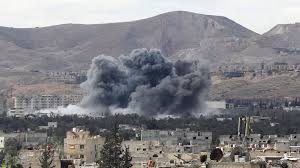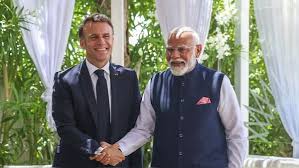
Even minutes after the United Nations Security Council pushed Syrian regime’s backer Russia to agree to a ceasefire, the bombardment of eastern Ghouta, a suburb of Damascus, still continued.According to a UK based monitor called Syrian Observatory for Human Rights, the regime has killed over 500 people in less than a week. The regime calls it a lie, but the locals from Ghouta say Assad has been raining lethal barrel bombs, among other ammunition, on 350,000-400,000 remaining inhabitants of Ghouta, shoving them underground.
The regime first imposed a siege in the area, ringing the capital in May 2013. Albeit at prices ten times higher than in Damascus, basic materials like food and fuel were supplied through the al-Wafideen opening. Rebels also dug tunnels leading to Damascus to smuggle in the goods. Since late last year, the siege has been absolute. Syrian forces bombed the tunnels and sealed Wafideen.
Ghouta is an agricultural area spread over a 100-square kilometers. The farms enabled the locals to procure vegetables, fruit and milk from the farmers but with the relentless air-war, which began mid-February, people are running for cover. Searching for food under the sky has become life-threatening.
The scale of the tragedy in Ghouta expanded as Russia stalled the resolution at the UN claiming the regime needed to fight groups shelling the old city in Damascus, which is barely a few kilo metres away from the battered suburb. Moscow and the Assad regime say these groups are terrorists.
As Assad and his men give a final push to regain the lost territory, graphic videos of dead children and of bleeding injuries were communicated by the activists of Syrian American Medical Society or SAMS, working on the ground in Ghouta.
The picture of a young boy shrouded in a blue cloth is one of the most disturbing. Stiff with rigor mortis, he is lying with his mouth and eyes open. The doctors of SAMS allege that the cause of the death was the exposure to chlorine gas. Medics say the symptoms are consistent with the impact of chlorine, like difficulty to breathe, convulsions and the irritation of the eyes and mouth. They add that at least 18 more patients are being treated for the same signs in the town of al-Shifoniyeh where the attack allegedly took place.
The Russians have called it a propaganda tool employed by the rebels to gain international support while the Syrian regime has not responded. Previously, the Assad’s government has been blamed for using chemical weapons by the UN. An inquiry by the international body concluded that the regime had conducted three other chlorine attacks in the rebel held areas in 2014 and 2015. A joint inquiry by the UN and the Organisation for the Prohibition of Chemical Weapons [OPCW] also accused the Syrian regime of being behind the 4 April 2017 Sarin agent attack in the opposition held town of Khan Sheikhoun.
Not just the government, the Islamic State was also found to have used mustard gas by the UN.Until another inquiry into the recent allegation is initiated, it is hard to ascertain the truth. Yet, based on the investigations in the past, the regime faces serious questions.
Ghouta’s ‘rebels’
Ghouta is dominantly under the control of two militant groups — Jaysh al-Islam (funded by Saudi Arabia) and Faylak al-Rehman (funded by Qatar). The ideology of Jaysh is Wahabi/Salafi and the group has stated that it wants Syria to be governed by a strict interpretation of the Sharia law. Faylak has had ties with Al Qaeda affiliate Hayat Tahrir al Sham, earlier known as Jabhat al-Nusra, and has close ties with the Muslim brotherhood of Egypt.
These actors are hard Islamists and have failed in convincing secular, if not liberal, Syrians that they are more of a problem than a solution to Syria’s issues. Instead, opposition with such ideology leading the rebellion has weakened the cause of the initial uprising which stood up for more political and economic rights. Their presence, Syrians we spoke to in Damascus fear, will lead to a sectarian divide in the country and snatch away the rights of the women.
A divided country
Born and raised in Damascus, Ghoufran lost her sister, Nour, and 18-month-old nephew, Raid, to a rebel mortar. They were dining at Bab Touma in the Christian part of the capital barely three kilometres from the eastern Ghouta front line.“They [the rebels] are terrorists. They killed my sister and baby nephew,” she told me via encrypted communication from Damascus.Ahmad (name changed), an anesthetic technician in Ghouta, holds an opposite view.
“Bashar al-Assad is a terrorist. He is killing our children,” he said from the operation theatre in a basement where he is catering to those injured in the bombing by the regime and allegedly also by the Russian planes.Ghoufran repeats the regime line and sets the liability of civilian casualties in Ghouta on the rebels.“The ‘terrorists’ are not letting the civilians get out, using them as human shields,” she said.
In the past, NGOs have documented cases of both the regime and the rebels blocking the exit of civilians from Ghouta. Responding to Ghoufran’s assertion Ahmad, however, says, “no one has stopped us from leaving. But why should I leave my home, my town?”Neither Ghoufran nor Ahmad are unsympathetic to the pain of the other, yet side with opposing forces at war.
The almost eight-year-long civil war in Syria has killed 400,000 and displaced half of Syria’s 22 million citizens. The country is split down the middle and it will be hard, if not impossible, for the neighbours to reconcile in the future.There are stories of personal tragedies both in Damascus and Ghouta, but the punishment meted out to Syrians living in rebel-held areas far exceeds those in regime-held parts.
The balance of power tilted in Assad’s favour in December 2016 when he regained Aleppo. He is on a winning spree and doesn’t intend on stopping until he regains Ghouta. He says he is doing it to keep Syria united and to banish the “terrorists”. Pro-Assad Damascenes agree. Their compatriots, a short-drive away, inhabit a world destroyed by the regime. Some of them agree with the rebels ideologically, others feel threatened by them but most are apprehensive they may be targeted by the Baath machinery if they leave.
Ghouta’s limited options
Syrian forces are soon expected to double up the efforts by adding a ground assault to the fire breathing jets in the sky. Adopting for a gradual approach, while it will allow temporary ceasefires, armed offensive will continue under the name of taking on Hayat Tahrir al-Sham — the Al Qaeda affiliate — even though they are the smallest anti-Assad faction in Ghouta. The regime will focus on defeating rebels in one town after another and will eventually move towards evacuation agreements to push the rebels into Idlib.
Siege-retake-seek surrender or transfer to Idlib, has been the regime’s strategy. This method has been tried in Aleppo by Assad and worked to the regime’s benefit. Applying it to Ghouta has so far been unsuccessful because a year after pushing out the rebels from Aleppo, it attacked them in Idlib.Based on the experience of friends in Aleppo, the rebels in Ghouta have deduced that they would be met with the same fate and prefer to stay put.
The rebel conglomerate is trying to remind its backers in the Gulf and Istanbul of promises made in the heady-days of the uprising.In military might, there is a huge mismatch between the force rebels can exert when compared to the regime. If these opposition factions choose to fight, their defeat is certain. Banking on help from the west-led international community hasn’t yielded much either.
The regime loyalists emphasise how desperately they wish for a safe evacuation of Ghouta’s civilians, yet in the past, the Syrian army has been accused of refusing to accept even the sick. The rebels have been charged with the same, only to a greater extent. The opposition worries about losing its grip on the territory if they can’t make a human case to keep it. There are other reasons to not leave the intensive fighting.Hussain (name changed) is hiding with his wife and three children in his basement in Douma. He points to the vast scale of destitution imposed on the Syrians who left from other parts of the country and prefer to be under rebel territory.
“Here I might die. If I leave, I will die” he told me from Douma in eastern Ghouta. Hussain’s sentiments give an insight into the deep seated mistrust a section of the Syrians harbour against the regime.“If I leave, I leave my home and everything I’ve ever built,” Hussain voiced the concern of thousands who are petrified with the nightmarish state of displaced Syrians, languishing within and outside Syria.
The battle for Ghouta is on even during the 30-day ceasefire as Russia has given in only a five-hour-daily reprieve. Syrian military and militias have gathered outside Ghouta to march in on orders and some reports to that effect have started filtering in. The civilians of Ghouta are falling as war collateral.
Courtesy :ORF
Author Profile
- India Writes Network (www.indiawrites.org) is an emerging think tank and a media-publishing company focused on international affairs & the India Story. Centre for Global India Insights is the research arm of India Writes Network. To subscribe to India and the World, write to editor@indiawrites.org. A venture of TGII Media Private Limited, a leading media, publishing and consultancy company, IWN has carved a niche for balanced and exhaustive reporting and analysis of international affairs. Eminent personalities, politicians, diplomats, authors, strategy gurus and news-makers have contributed to India Writes Network, as also “India and the World,” a magazine focused on global affairs.
Latest entries
 DiplomacyJanuary 5, 2026India walks diplomatic tightrope over US operation in Venezuela
DiplomacyJanuary 5, 2026India walks diplomatic tightrope over US operation in Venezuela India and the WorldNovember 26, 2025G20@20: Africa’s Moment – The Once and Future World Order
India and the WorldNovember 26, 2025G20@20: Africa’s Moment – The Once and Future World Order DiplomacyOctober 4, 2025UNGA Resolution 2758 Must Not Be Distorted, One-China Principle Brooks No Challenge
DiplomacyOctober 4, 2025UNGA Resolution 2758 Must Not Be Distorted, One-China Principle Brooks No Challenge India and the WorldJuly 26, 2025MPs, diplomats laud Operation Sindoor, call for national unity to combat Pakistan-sponsored terror
India and the WorldJuly 26, 2025MPs, diplomats laud Operation Sindoor, call for national unity to combat Pakistan-sponsored terror







